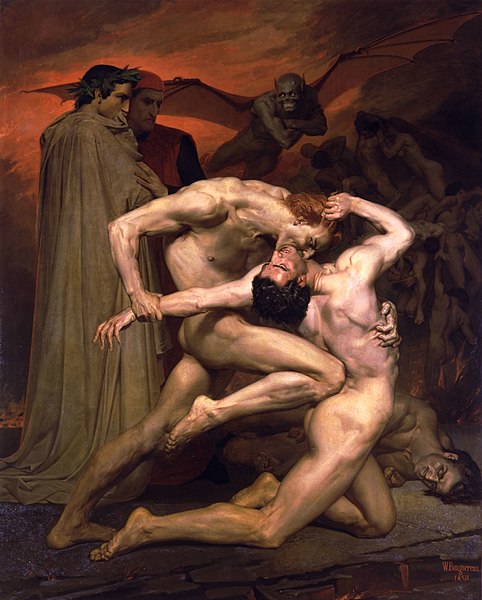
There was a time when the earth was not a goldilocks, blue-eyed planet, despite having no people or for that matter animals to suffer. If there had been any people, they would have suffocated, because there was no free oxygen to breathe. It was an ugly place. Once meteorites have given way, hot brown soup brewed on its surface..
This original (primordial) environment provides the context for Stanley Miller’s experiment.
It is described by Richard Dawkins on Melvyn Bragg’s „In Our Time” (BBC)
Stanley Miller performed an extraordinary experiment. He got together the ingredients which were thought to be present in the early Earth atmosphere. (around 3.9 billion years ago) and set up an apparatus, in which he had the flask which represented the sea and a flask which represented the atmosphere above it and put into the atmosphere non-oxygenated ingredients of the early earth. There was electric spark, which simulated lightening strikes. And he just left it for a couple of weeks. And at the end of this time they had accumulated in the sea (the lower of the two flasks, the one with water, a thin brown liquid, which when he analysed it, it turned out to be pretty much what J.B.S Haldane had speculated as the hot brown soup. It contained numerous organic compounds, many of which were vital to the origin of life, aminoacids of various kinds, including several aminoacids from the twenty that life actually uses.
Melvyn Bragg
We are not talking yet about the origin of life..
Richard:
There was nothing living there.
Melvyn Bragg
So what did it prove?
It proved that the conditions of the early earth were ripe for a synthethis under the ordinary laws of chemistry of many of the basic building blocks of life. It was a precondition of life, it was not life itself.
[unquote]
But suppose we walked an extra mile and attempted to actually create life. If evolution is a natural experiment, it can in principle be replicated. So let us perform a thought experiment. I already have a name for it: “Empty Witness Box”, because it is not quite certain if our experiment in life-creation will have any witnesses.
The rules of the game are not complicated. Take a sterilised strong box of any size whatsoever with a covered opening to put solid and liquid substances inside. You are allowed to put anything into the box, but you are not allowed to take anything out of it. I fact, you are not even allowed to look into it, to peep through the hole. To make sure, let us also make the box soundproof. You have as much time as you need and because people are mortal, let us assume that the experiment is conducted not by one scientist, but generations of them (like those who interacted for millions of years with the “Deep Thought” computer in the Hitchhiker’s Guide to the Galaxy). They are even allowed to evolve. jettison their awarenesses in the evolution and even turn into machines, because nothing in the experiment depends on the nature of the experimenter. Because he is not even allowed to look, he will certainly not witness the reactions inside the box, so he is basically irrelevant, a mere technician potentially replaceable by a robot.
Let me repeat: potentially any ingredients can be poured or deposited into the box. Once inside it, any chemical or otherwise reactions can take place. You can cook brown soup, red soup, blue soup, this is not important, as long as you do not look. Apart from this there are no conditions on the substances and processes of the experiment.
Why is this not important? The reason is that we are interested in possibilities and not the actual outcome. And we are not so much interested in creating life, but in making consciousness emerge.
Whatever happens inside the box is without witnesses. The main question is: „Is it nevertheless possible that the process will be witnessed?”.
Let us take three philosophers:
MATERIALST: Of course it is possible, if not very likely. Once evolution kicks off and sensual beings start to evolve, we will have witnesses. Your experiment is an evident nonsense. You should rather look into the box and study the interesting science of it.
NON-RELIGIOUS DUALIST: I am not sure. Perhaps what will evolve as creatures with eyes and ears will be zombies. I have no intuitions as to how mind combines with matter. In the historical evolution mind clicked with matter, but I am not sure about EVERY evolution. I do not know where consciousness comes from. It seems to jump out like a jack in the box (pardon my metaphor). It did not get there from outside. Usually when I want to know about other minds I ask people questions and make my inferences. But here I cannot even make an inference. Anyway, you should ask Chalmers.
RELIGIOUS DUALIST: You are all nuts. Only God can create life. What is in the box can be complex automata, which do not see, let alone hear anything, so they cannot be witnesses. But I can grant you one thing: they can be alive and conscious (and not just kicking). God can make anything alive. In any case there is always a witness – his name is God. Instead of playing God, go to church and pray for your soul, which is obviously on its way under.
Which category are you in? And do you sit there comfortably or would you rather like to switch your label from time to time?
(pls give me some time to correct the syntax and introduce links






